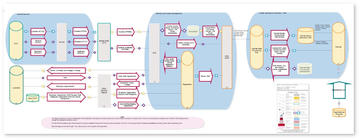What is the Application Catalogue?
The Application Catalogue (requires VPN, access via a service request, see below) provides a comprehensive list of all applications (business systems, platforms, middleware) which are available to Oxford Single Sign-On users, including those applications that are available by default, or optional ones for specific needs. Any member of staff looking for bespoke applications, such as a researcher looking for a modelling and analysis tool, can quickly see what analysis applications we support, how they can get access to them and what licenses may be required.
How do I use the Application Catalogue?
The catalogue is searchable and can be sorted by key properties, such as which applications are available via the Cloud, how they are backed up, what versions are supported, what licenses are required (coming soon), and whether or not applications contain GDPR sensitive data. Applications can be found via association, such as what applications are used to support the Identity and Access Management Service, or what applications are used in the business process of managing interviews. Or you can just browse via Organisation (teams and departments) or Capabilities (the things we do, such as research), so you can drill down to only areas which are relevant to you.
Users can also export the Application Catalogue information easily to an Excel output and reuse the information as required.
Who is this for?
Application modelling (the tables and properties within it, the structure, the data flow in and out etc.) happens every time a project is undertaken in IT Services, and this has been built up for years. Using Casewise-Evolve, we have made all this existing work available to you in one place. This central resource has opened up a wealth of institutional knowledge to people, which often only previously existed in people’s heads. It has also saved, sometimes, weeks’ worth of time for many different teams and for many different reasons:

- Business analysts, developers, database administrators and project managers planning an application change, upgrade or a replacement can use this catalogue to understand an application in full; where its data flow to and from, what type of data it holds, what processes are performed using it, what technology underpins it and what services it supports.
- Service desks can use the integration mapping to help diagnose data or reporting issues (data can flow through many other applications, with filters and transformations, before it reaches the application you are using – being able to see the map is vital in understanding any problem.
What does the Application Catalogue cover?
The Application Catalogue has focussed so far on the most important applications to the University. This includes applications which:
- support a key business capability (such as research, teaching and learning or widening engagement)
- directly support an IT Service or UAS support service
- are part of the standard applications available on CONNECT managed machines (coming soon)
- are part of the University top 50 Business Critical Applications list
- are backed up by IT Services backup services
We have been working closely with colleagues around the University to document and update the catalogue, making it as useful as possible for everyone. Most of the business-critical applications are based in UAS, and so this is the area which is the most mature, however the catalogue is an ongoing project and will be expanded to the whole of the collegiate University within the next three years.
How do I get access?
The catalogue is available on the Casewise-Evolve website where read-only access is available to all University staff members (request access via a service request).
The wider IT eco-system
The Application Catalogue offers a powerful resource to have at your fingertips, but it forms part of a wider IT eco-system, and sits alongside many other components which make up the running of the University IT systems. Application environments, integrations, services, business process, projects, technology, physical data (as in the tables and the properties) all interact to ensure the successful running of day to day University life.
We welcome your feedback on what would add value for you against applications, please send any feedback to Casewise-Evolve@it.ox.ac.uk